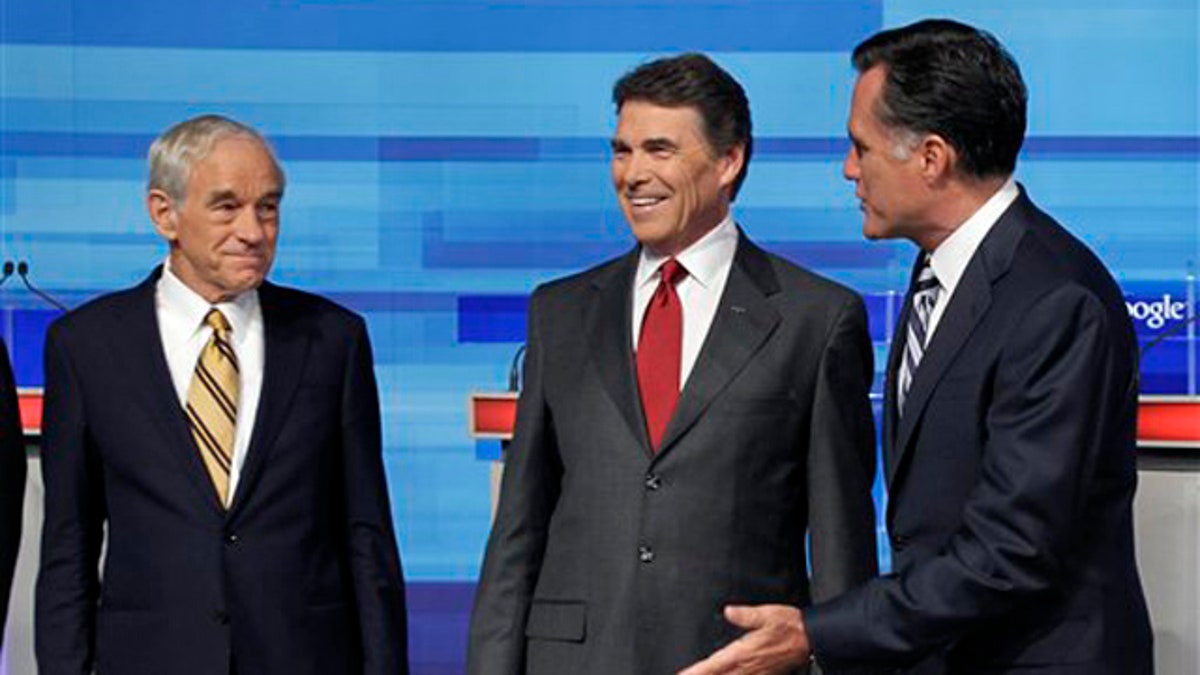
Sept. 22: Republican presidential candidates Rep. Ron Paul, Texas Gov. Rick Perry and former Massachusetts Gov. Mitt Romney greet each other prior to the Fox News/Google debate in Orlando, Fla. (AP)
The confetti is thrown. The champagne is raised. The New Year has arrived. Time to vote?
The accelerated election schedule may not be that jarring, but it could be close. States pushing up the dates of their primaries in an effort to gain more influence could mean the contests to select a Republican challenger to President Obama would start a full 11 months before the general election.
Even though both political parties tried to avoid a repeat in 2012 of a similar scenario in 2008 by delaying early presidential primaries and caucuses, states are leapfrogging their dates, threatening to push the first Republican contests into the early part of next year.
A Florida commission is expected to announce Friday that its presidential primary will be held Jan. 31, according to Florida House Speaker Dean Cannon, though GOP officials from other states are lobbying Florida to reconsider.
The move by Florida could spark a stampede by Iowa, New Hampshire, Nevada and South Carolina, which were granted special status by both political parties, allowing them to hold the first nominating contests.
"The bottom line is, if Florida moves, I'm moving," said South Carolina GOP Chairman Chad Connelly, who has the authority to schedule the state's Republican primary. "We're going to be the first-in-the-South presidential preference primary, no matter what it takes."
Connelly said he would try to schedule South Carolina's primary as close to Florida's as possible, perhaps holding it the Saturday before the Florida vote, on Jan. 28. That scenario could push the Iowa GOP caucuses to Jan. 9, followed by the New Hampshire primary Jan. 17 and the Nevada causes Jan. 21.
This scenario, however, assumes that no other state jumps into January.
"Iowa will be first. The only open question is the date on which we hold our first-in-the-nation caucuses," Iowa GOP chairman Matthew Strawn said. "Ironically, in attempting to assert increased relevance in the process, Florida's move only elevates the importance of Iowa and the other early states. A compressed caucus and primary calendar makes doing well in the four kickoff states a necessity for a candidate to secure the Republican nomination."
On the other hand, Georgia went against the recent trend, announcing Thursday it will hold its primary March 6, which is the 2012 version of Super Tuesday.
The leading candidates in the field are former Massachusetts Gov. Mitt Romney and Texas Gov. Rick Perry. But businessman Herman Cain surged in the latest Fox News poll and has joined the top tier for now. Farther back in the polls are former House Speaker Newt Gingrich, Rep. Michelle Bachmann of Minnesota and Rep. Ron Paul of Texas.
The Republican National Committee's deadline for setting primary and caucus dates is Saturday, though some states may miss it. Those states could have their delegations challenged at the national convention in Tampa, Fla. Four years ago, New Hampshire waited until Nov. 21 to schedule its primary, which was held Jan. 8. That year, the Iowa caucuses led the way on Jan. 3.
By law, New Hampshire Secretary of State William Gardner must schedule the Granite State's primary at least seven days ahead of all similar contests. State party rules require Nevada to hold its Republican caucuses four days after New Hampshire's primary, Nevada GOP Chairwoman Amy Tarkanian said.
The RNC tried to regain control of the primary calendar by passing a rule that penalizes states that schedule nominating contests before March 6, requiring them to forfeit half their delegates to the national convention. Special provisions were made for Iowa, New Hampshire, Nevada and South Carolina, which were allowed to schedule contests in February.
The goal was to delay the beginning of a primary season that many believe starts too early, lasts too long and leaves voters weary long before the November general election.
"The whole idea of the RNC rules was to bring maybe a little more sanity to the process by getting it out of the holiday season so that people weren't getting phone calls on Christmas Eve," Saul Anuzis, a member of the Republican National Committee from Michigan, said in an interview.
Michigan risks losing half its delegates because the state has scheduled a primary for Feb. 28, the same day as Arizona. Anuzis said the Michigan date is set by state law.
Colorado, Minnesota and Maine are also looking to hold GOP caucuses in early February. They won't violate party rules if their straw polls don't actually award delegates to candidates, though they would compete for attention with other early voting states.
The Missouri primary date is set for Feb. 7 by state law, though state GOP leaders were considering alternatives Thursday, perhaps holding separate caucuses at a later date to award delegates to the convention.
RNC Chairman Reince Priebus has no leeway to wave the penalties for states that break the rules, spokeswoman Kirsten Kukowski said.
"The rules are the rules," Kukowski said. "Any state that violates the rules will lose 50 percent of their delegates."
Four years ago, Florida and Michigan held early GOP primaries against party rules, and were supposed to lose half their delegates. Eventually, the states had their entire delegations seated at the national convention, though they lost half their votes in a nomination election that was already a forgone conclusion.
"My overall frustration is, we've got this set of rules that we're not going to follow," South Carolina’s Connelly said. "So it just means that the party's rules have no teeth, and all these states can jump the date."
The Associated Press contributed to this report.




